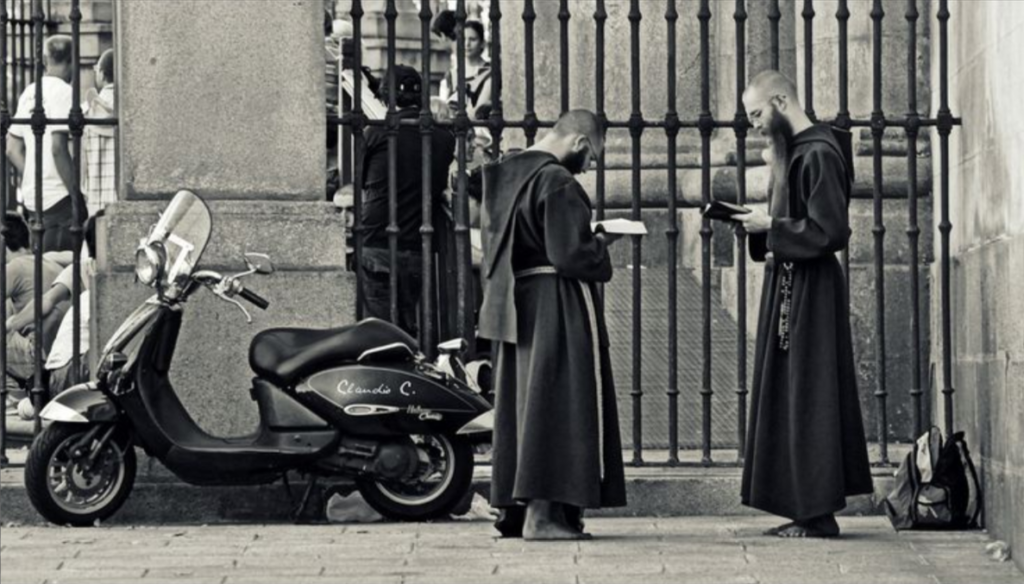The perfect joy of St Francis always appealed to me, yet a recent reading and reflection advanced the charming story to an understanding of living within honesty, forsaking dreams and delusion. Dreams and delusion too often steer the mind toward glorification of one’s self, a doing of great things, a usurping of the will of God, the advancement of individuality preventing one from living within the moment, reality rejected for the sake of possibilities, uncompliant with one’s current standing. There are enough people doing great things. The story is a bit dramatic, cunning with insight. The grandeur of accepting the sufferings of daily life ultimately providing the greatest of joys, the development of discipline leading to a concentration upon Christ within the individuality of our lives, is playfully exercised.
How Saint Francis, walking one day with brother Leo, explained to him what things are perfect joy.
One day in winter, as Saint Francis was going with Brother Leo from Perugia to Saint Mary of the Angels, and was suffering greatly from the cold, he called to Brother Leo, who was walking on before him, and said to him: “Brother Leo, if it were to please God that the Friars Minor should give, in all lands, a great example of holiness and edification, write down, and note carefully, that this would not be perfect joy.”
A little further on, Saint Francis called to him a second time: “O Brother Leo, if the Friars Minor were to make the lame to walk, if they should make straight the crooked, chase away demons, give sight to the blind, hearing to the deaf, speech to the dumb, and, what is even a far greater work, if they should raise the dead after four days, write that this would not be perfect joy.”
Shortly after, he cried out again: “O Brother Leo, if the Friars Minor knew all languages; if they were versed in all science; if they could explain all Scripture; if they had the gift of prophecy, and could reveal, not only all future things, but likewise the secrets of all consciences and all souls, write that this would not be perfect joy.”
After proceeding a few steps farther, he cried out again with a loud voice: “O Brother Leo, thou little lamb of God! if the Friars Minor could speak with the tongues of angels; if they could explain the course of the stars; if they knew the virtues of all plants; if all the treasures of the earth were revealed to them; if they were acquainted with the various qualities of all birds, of all fish, of all animals, of men, of trees, of stones, of roots, and of waters – write that this would not be perfect joy.”
Shortly after, he cried out again: “O Brother Leo, if the Friars Minor had the gift of preaching so as to convert all infidels to the faith of Christ, write that this would not be perfect joy.”
Now when this manner of discourse had lasted for the space of two miles, Brother Leo wondered much within himself; and, questioning the saint, he said: “Father, I pray thee teach me wherein is perfect joy.”
Saint Francis answered: “If, when we shall arrive at Saint Mary of the Angels, all drenched with rain and trembling with cold, all covered with mud and exhausted from hunger; if, when we knock at the convent-gate, the porter should come angrily and ask us who we are; if, after we have told him, “We are two of the brethren”, he should answer angrily, “What ye say is not the truth; ye are but two impostors going about to deceive the world, and take away the alms of the poor; begone I say”; if then he refuse to open to us, and leave us outside, exposed to the snow and rain, suffering from cold and hunger till nightfall – then, if we accept such injustice, such cruelty and such contempt with patience, without being ruffled and without murmuring, believing with humility and charity that the porter really knows us, and that it is God who makes him speak against us, write down, O Brother Leo, that this is perfect joy.
And if we knock again, and the porter comes out in anger to drive us away with oaths and blows, as if we were vile impostors, saying, “Begone, miserable robbers! You shall neither eat nor sleep!” – and if we accept all this with patience, with joy, and with charity, O Brother Leo, write that this indeed is perfect joy.
And if, urged by cold and hunger, we knock again, calling to the porter and entreating him with many tears to open to us and give us shelter, for the love of God, and if he come out more angry than before, exclaiming, “These are but importunate rascals, I will deal with them as they deserve”; and taking a knotted stick, he seize us by the hood, throwing us on the ground, rolling us in the snow, and shall beat and wound us with the knots in the stick – if we bear all these injuries with patience and joy, thinking of the sufferings of our Blessed Lord, which we would share out of love for him, write, O Brother Leo, that here, finally, is perfect joy.
And now, brother, listen to the conclusion. Above all the graces and all the gifts of the Holy Spirit which Christ grants to his friends, is the grace of overcoming oneself, and accepting willingly, out of love for Christ, all suffering, injury, discomfort and contempt; for in all other gifts of God we cannot glory, seeing they proceed not from ourselves but from God, according to the words of the Apostle, “What hast thou that thou hast not received from God? and if thou hast received it, why dost thou glory as if thou had not received it?” But in the cross of tribulation and affliction we may glory, because, as the Apostle says again, “I will not glory save in the cross of our Lord Jesus Christ.” Amen.”
To the praise and glory of Jesus Christ and his poor servant Francis. Amen.






Recent Comments